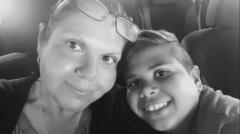Following a lengthy 12-week trial, Jack Steven James Brearley, 24, and Brodie Lee Palmer, 29, were convicted for their roles in the violent death of Turvey, a Noongar Yamatji boy. The incident occurred in October 2022 when Cassius was pursued by a vigilante group and assaulted, leading to head injuries that eventually claimed his life ten days later. The aftermath saw an outpouring of grief, leading to vigils and protests across Australia reflecting outrage over the case.
A total of four individuals were charged in connection with his death. While Brearley and Palmer received murder convictions, a third individual, Mitchell Colin Forth, was found guilty of manslaughter, and a female companion involved was acquitted. Outside the courtroom, Mechelle Turvey, Cassius’s mother, expressed mixed feelings of relief about the verdict, stating that "justice" is ultimately unattainable since she lost her son.
The trial revealed that the violent encounters resulted from a series of unrelated events. Prosecutors indicated that the group was allegedly searching for those responsible for damage done to Brearley’s car when they encountered Cassius and other children. Surveillance footage from the area provided evidence of Brearley's intent before the assault, highlighting a chilling statement he made regarding the consequences of the vandalism.
Despite their defense claiming that the assault could have been self-defense and shifting blame among themselves, the jury determined that both Brearley and Palmer held culpability for Turvey’s murder. Sentencing for the men is expected to take place on June 26.
Cassius was remembered fondly by friends and family as a hardworking and kind individual who engaged in local community initiatives to challenge negative perceptions of Aboriginal youth. His tragic death spurred national conversations about systemic racism in Australia, with Prime Minister Anthony Albanese labeling the attack as racially motivated, despite its absence in court arguments.
The case continues to resonate throughout the nation, reigniting discussions on racial dynamics and violence against Indigenous peoples in Australia.
A total of four individuals were charged in connection with his death. While Brearley and Palmer received murder convictions, a third individual, Mitchell Colin Forth, was found guilty of manslaughter, and a female companion involved was acquitted. Outside the courtroom, Mechelle Turvey, Cassius’s mother, expressed mixed feelings of relief about the verdict, stating that "justice" is ultimately unattainable since she lost her son.
The trial revealed that the violent encounters resulted from a series of unrelated events. Prosecutors indicated that the group was allegedly searching for those responsible for damage done to Brearley’s car when they encountered Cassius and other children. Surveillance footage from the area provided evidence of Brearley's intent before the assault, highlighting a chilling statement he made regarding the consequences of the vandalism.
Despite their defense claiming that the assault could have been self-defense and shifting blame among themselves, the jury determined that both Brearley and Palmer held culpability for Turvey’s murder. Sentencing for the men is expected to take place on June 26.
Cassius was remembered fondly by friends and family as a hardworking and kind individual who engaged in local community initiatives to challenge negative perceptions of Aboriginal youth. His tragic death spurred national conversations about systemic racism in Australia, with Prime Minister Anthony Albanese labeling the attack as racially motivated, despite its absence in court arguments.
The case continues to resonate throughout the nation, reigniting discussions on racial dynamics and violence against Indigenous peoples in Australia.



















